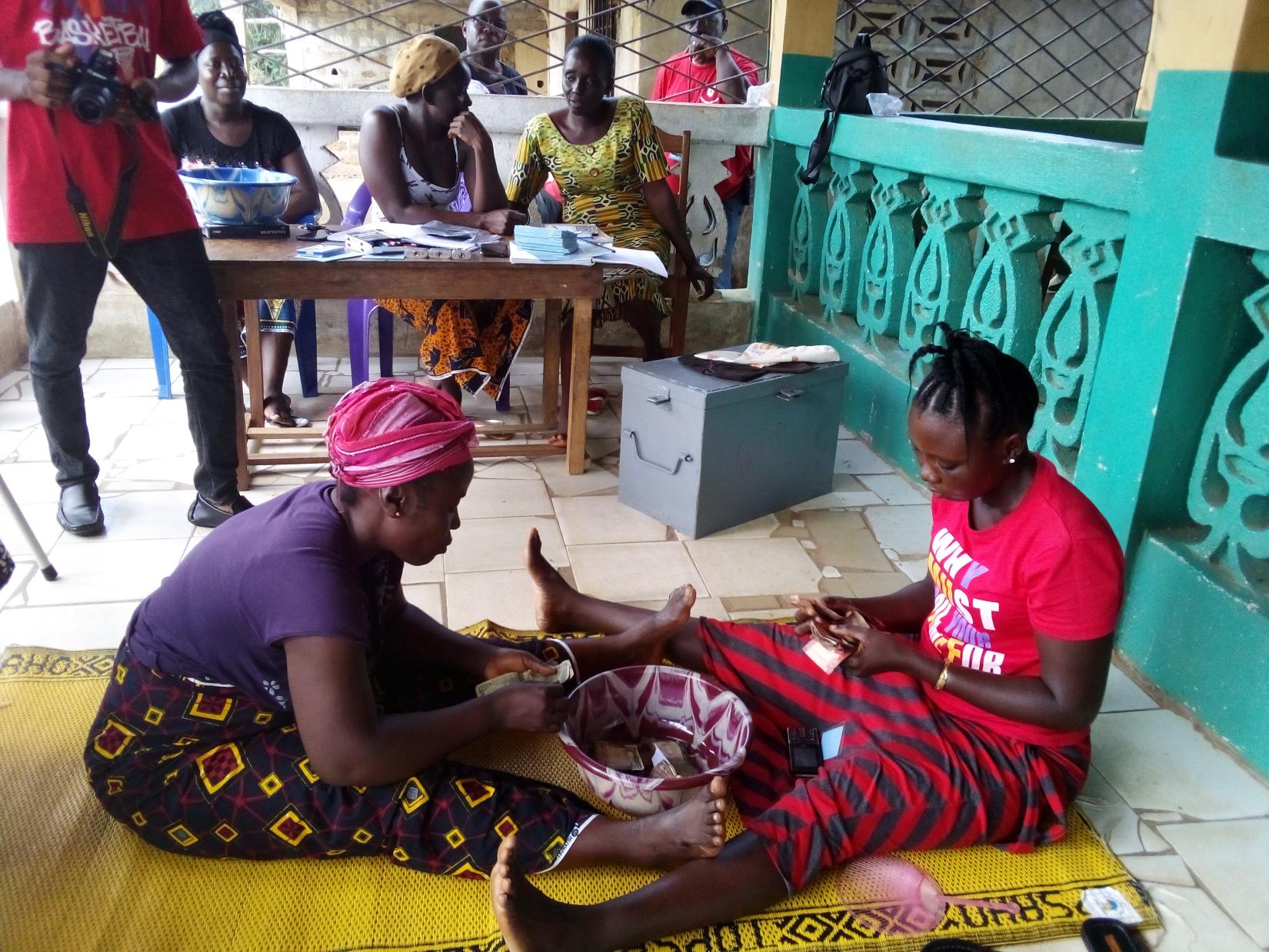FAO under a joint peacebuilding project with UNDP and the Government of Liberia, empowers farmers to increase agriculture production using the Village Savings and Loans scheme
09 December 2019
Increasing farmers access to credit and income generating capacity
- The United Nations Peacebuilding project, jointly implemented by the Food and Agriculture Organization of the United Nations (FAO) and the United Nations Development Programme (UNDP) focusing on components within their mandate and comparative advantage, continues to reach out to the most vulnerable rural populations especially young women by providing the needed alternative livelihood opportunities.

The Multi-Partnership Trust Fund Project titled: “Strengthening Conflict Prevention through the Establishment of Multi-stakeholders Platforms and Improved Alternative Livelihoods” led by FAO, is providing increased support to nine (9) concession affected communities in Bomi (Gbar-Jakeh, Beh-sao and Moore Town) and Nimba (Sippi Town, Zolowee, Minkinto and Sayeaga).
The two agencies are jointly coordinating their efforts alongside the Government of Liberia to reach out to over 1500 direct beneficiaries in Bomi and Nimba Counties.
UNDP coordinates the aspects on establishing and capacitating multi-stakeholder platforms (MSPs) that incorporate opinion leaders including civil society representatives and local leaders (town chiefs, commissioners, women and youth) and (MSP) is strategically positioned between the government, concessionaires, and these communities. The MSP is “an innovative approach for peacebuilding and social cohesion. It works to ensure effective prevention and resolution of concessions land-related conflicts. These platforms have helped resolve differences amicably, preserving agreements between all parties through MoUs and consensus”.
FAO leads the component that helps provide sustainable alternative livelihood to affected communities. Through a local Implementing Partner “Universal Empowerment Mission”, FAO rolled out an intensive two-week capacity development exercise for targeted beneficiaries simultaneously in the seven (7) project communities in the two counties. The exercise aimed to equip the beneficiaries with skills and knowledge in Business Management and Marketing, and Village Savings and Loan Association (VSLA) for sustainable access to credit, agriculture-based income generating activities and social cohesion in group spirit. The training targeted seven (7) VSLA groups comprising 240 young women (cassava, poultry and vegetables producers) across the two project counties.
FAO provided agriculture inputs and postharvest facilities
In addition to the VSLA and Business Management and Marketing capacity enhancement support, FAO is providing support to the farming communities consisting of women farmers who make up majority of Liberia’s smallholder producers and agricultural labour force with improved rice seeds, cassava cuttings and hand tools, backed by extension services to enhance production and productivity.
Two postharvest facilities have been constructed and equipped with agro processors in the counties to enable farmers minimize postharvest losses.
Farmers embraced the ideas of FAO and government of Liberia
Emmanuel N. Zangbory, Secretary of the SLAC Farmers’ Cooperative in Nimba County, which hosts four communities, described the training as “rewarding” adding, “This is the first time for such a training to be introduced to our farmers. This is helpful, it will encourage the women to get involved in agriculture.”
He noted that since the introduction of the project in the four communities, farmers have been actively, working in groups, and agricultural activities are moving well among them. “The women here only depend on farming, this will be a great help for them,” he added.
Rev George Dale, Programme Officer, Universal Empowerment Mission, added that from the training, the women have established by-laws and constitutions that will ensure effective regulation and management of the groups activities and engender them sustainably. “We introduced to them group election, meeting procedures, business management and social fund policies and practices as well as constitutional development,” he noted. Further, he mentioned that the training also provided the opportunity for the groups to have a broader knowledge on loan disbursement and repayment to enable them to identify their income at the end of the cycle. He added that the project is a unifier as women are brought together and united under a common purpose, expressed enthusiasm in acquiring the knowledge to enhance their agriculture activities.
A clearly ecstatic Bendu Scott, Chairlady, “Think for tomorrow” VSLA group in Beh-sao, Bomi County, took the podium, and speaking on behalf of her group, requested FAO for additional support to consider expanding the training to reach out to other women.
The chairlady of the thirty (30) women’s group underscored the importance of the training, “We are so happy for your support. We appeal to FAO to provide similar support to other women who are not part of this training. This is an opportunity that is provided to help us increase our production.” She added that women from the three communities (Gbar-Jakeh, Beh-sao and Moore Town), in Bomi benefited from the training.
She noted that the VSLA introduced by FAO will improve their agriculture production, empower them economically and improve their self-reliance (dependence on their husbands).
Next Steps
Working through the Government of Liberia, FAO Liberia, UNDP, and its partners, will ensure that gains made are sustained. To this end, some capacity support has been provided to the GoL to undertake monitoring and follow-up actions through the decentralized structures of the Ministry of Agriculture and the National Bureau of Concessions.




